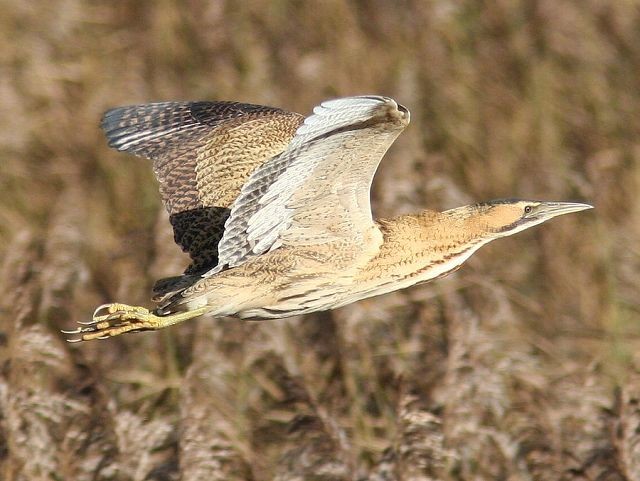Bittern Monitoring in 2008
Background and current monitoring
Following recolonisation of the UK early in the 20th century, Bittern numbers increased to a peak of about 70 booming males in the 1950s, but then fell to fewer than 20 in the 1990s, with similar declines witnessed in many other countries in Western Europe. By 1997, there were only eleven booming male Bitterns in the UK; these were mainly within Norfolk and Suffolk, but with a small outlying population at Leighton Moss in Lancashire. This historic decline and current rarity has led to Bittern being a UK BAP species and included on the red list of UK Birds of Conservation Concern. Bittern is also on Schedule 1 of the Wildlife and Countryside Act and Annex 1 of the EC Wild Birds Directive.

Bittern, Potteric Carr YWT, South Yorkshire (Photo:
Robert Askew)
A joint RSPB/Natural England programme, funded through Natural England's Action for Birds in England, has been responsible for monitoring the numbers of UK booming male Bitterns every year since 1990. The main aims of the annual survey are:
- To report the minimum and maximum numbers of booming male Bitterns in Britain.
- To report the minimum and maximum numbers of nesting females in Britain.
Since 1997, there has been a steady increase in the number of booming Bitterns, up to a peak of 55 boomers in 2004. However, there was then a slight decline in the following two years, with 44 boomers recorded in 2006. Encouragingly, numbers increased again in 2007, to 51 booming males at 33 sites.

Bittern, Moore NR, Cheshire (Photo:
Bob Tomlin)
A detailed summary of the 2007 season (a 280Kb PDF File) can be downloaded here. Alternatively you can view our previous article about the results here.
Please contact us if you hear any booming Bitterns this year: with reedbed creation throughout the UK and a rapidly expanding Bittern population, we are increasingly reliant on landowners, site managers, wardens and local birders to report booming to us. Please keep an ear out for them this spring, even at sites where they have not been heard for many years. To report a booming record or for more information, please contact Simon Wotton, on 01767 693396 or simon.wotton@rspb.org.uk.

